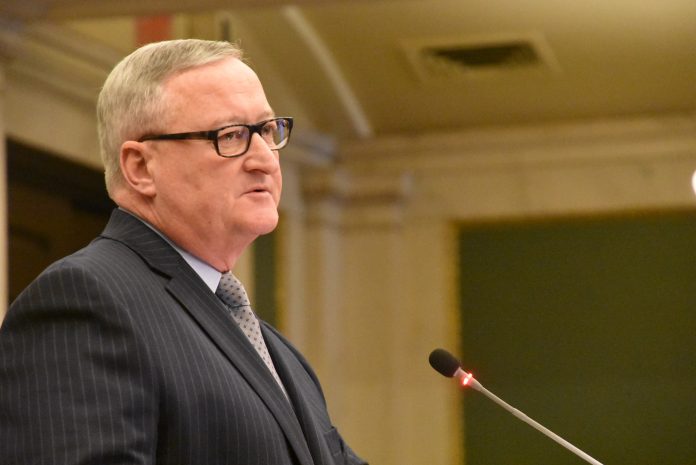Mayor Jim Kenney on Thursday unveiled his $5.2 billion proposed budget package, which includes increased spending on an ambitious college scholarship program and expanded street sweeping, but his message was clouded by intense debate over supervised injection sites.
Before Kenney took the podium, City Council members adopted a resolution criticizing Safehouse’s now aborted plan to open an injection facility in South Philadelphia.
All voted in favor of the resolution, except for Councilwomen Kendra Brooks and Helen Gym, following a lengthy back-and-forth in front of a raucous crowd of people on both sides of the issue that packed the chamber’s two balconies.
Kenney, in his first budget address of his second term, reiterated his support for the sites and said his administration would take a greater role in having conversations with residents around a potential site.
“I want to be very clear that I refuse to look another parent in the face and tell them I didn’t do everything I could to try and keep their child alive long enough to survive their disease,” he said.
Members of the public were more subdued by the time of Kenney’s speech, more than 90 minutes into the meeting. However, at one point, a heckler began calling Kenney “a sneak” as she was escorted out.
A controversial bill pushed by Councilman At-Large David Oh requiring community support for the establishment of an injection facility made it out of committee Monday after a marathon hearing.
Councilmen Bobby Henon and Brian O’Neill, who together represent most of the Northeast, both said they are opposed to supervised injection sites.
“It seems to be pretty broad-based opposition to these (sites), but I think more than anything else, you hear people not being told and something pushed on them,” O’Neill told the Northeast Times.
Henon said he would like to see investment in a comprehensive opioid strategy, with funding for long-term care and support, rather than injection sites.
He noted that his district and O’Neill’s have an overlay requiring a special zoning exemption for any medical use, meaning a potential facility would likely have to go to a registered community organization and the zoning board before opening.
Scholarships, sweeping and safety
Kenney’s proposed budget for fiscal year 2021 requests no new taxes or tax increases, but it does include a $118 million increase in spending, about 2.3 percent more than what the city expects to pay this year.
The biggest new investment, and perhaps the signature proposal of Kenney’s plan, is to create a scholarship program that would allow students to attend community college tuition-free and pay for other school-related costs.
Dubbed the Octavius Catto Scholarship, after a black activist who was killed while on his way to vote in 1871, the program covers a student’s remaining tuition after financial aid kicks in. The mayor’s office hopes to award 6,500 scholarships over the next five years.
“I want to send a clear message to our high school students, especially those who may think college is out of reach or simply cannot afford it,” Kenney said. “If you work hard and graduate high school, you can go to community college full-time, tuition-free. And even get money for books, transportation and food.”
Kenney during his speech shouted out Lylia Belbegra, a George Washington High School senior, as an example of someone who he said could benefit from the program.
Belbegra, an Algerian immigrant, plans to enroll in Community College of Philadelphia later this year and hopes to go on to study pre-med at Temple University.
The Catto Scholarship, which would receive $10.5 million in the coming year under Kenney’s proposal, would be open to any Philadelphia high school graduate whose expected family college contribution is under $15,000.
Council President Darrell Clarke said he and his colleagues are prepared to invest in CCP, and O’Neill said he thinks the scholarship is a great idea.
“I think the community college, they’ve been shorted so long by the city, that it’s really good that they’re getting money because it does give an awful lot of opportunities to people,” O’Neill said.
Kenney’s plan also includes a $45 million boost to the School District of Philadelphia, bringing the city’s total contribution to the school system up to $276 million.
The mayor wants to expand a street-sweeping pilot program that began last year citywide, so he proposed a $10 million increase to fund the initiative this coming year and $67 million over five years.
Kenney said residents who lived in the areas covered by the pilot program noticed cleaner streets and 96 percent of them supported an expansion. Six neighborhoods — none in the Northeast — were included in the pilot.
Details about which areas will be part of this year’s street sweeping program will be announced in the coming months.
“We’re in the process of working that out with the streets department right now and the Managing Director’s Office,” Henon said.
Combating gun violence has been a top priority for city officials, and Kenney’s budget proposal includes an $8 million increase to expand anti-violence programs, including the re-introduced Focused Deterrence, and an extra $5.7 million for the police department to expand its “Operation Pinpoint” strategy and other initiatives.
Henon said he wants to see the administration engaging with neighbors and community groups about bringing some of the new crime-fighting programs to the Northeast.
In addition, Kenney’s plan calls for a 6 percent increase in funding to the Free Library of Philadelphia, which he said would ensure six-day service year-round at all branches.
O’Neill said he wishes the city would cut back on spending increases and focus on becoming more competitive, but, overall, he was somewhat pleased with Kenney’s budget message.
“I look for bad things more than good things because that’s usually what happens. No real estate tax increases,” the longtime councilman said. “That’s the takeaway for me.”
Council will spend the next several months considering Kenney’s plan through a series of hearings that will begin later this month. ••






